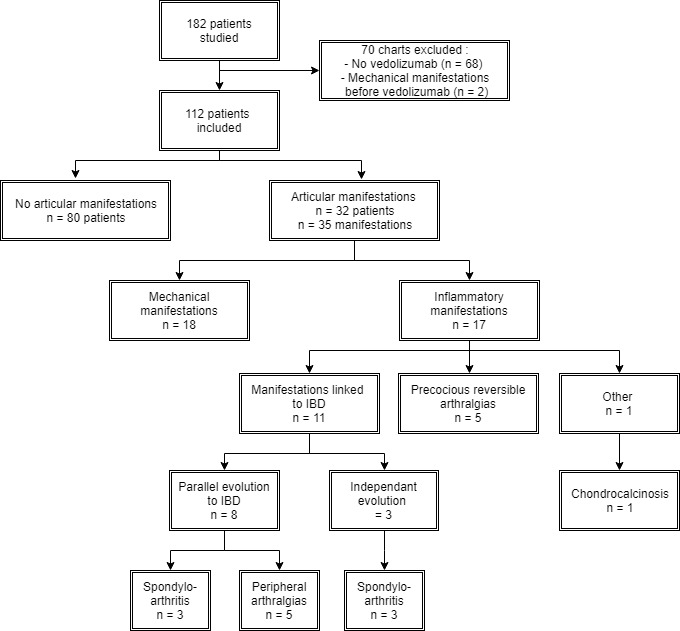Session Information
Date: Sunday, October 21, 2018
Session Type: ACR Poster Session A
Session Time: 9:00AM-11:00AM
Background/Purpose:
Vedolizumab is a humanised IgG1 monoclonal antibody anti-α4β7 integrin agent used in inflammatory bowel disease (IBD). It modulates gut inflammation by preventing leukocyte migration to gastro-intestinal mucosa. Vedolizumab is effective on IBD but has been incriminated in occurrence of articular manifestations. Our study aimed at describing rheumatic manifestations and their risk factors occurring in IBD patients treated by vedolizumab.
Methods:
In this retrospective monocentric study, we identified through a systematic electronic search all IBD patients treated by vedolizumab in rheumatology and gastroenterology of our hospital. We collected all the cases of incident articular manifestations occurring in the follow-up of these patients. Characteristics of articular manifestations were analyzed and classified as inflammatory or not, and characteristics of patients who presented inflammatory articular manifestations were compared to those of patients without.
Results:
Between february 2013 and june 2017, we indented 112 patients treated by Vedolizumab (56 women, mean age 39.9 ± 16 years, mean disease duration = 9.1 ± 7.8). The IBD was Ulcerative Colitis (UC) in 59 (52.7%), Crohn’s disease (CD) in 49 (43.8%), and undetermined colitis in 4 (3.6%). Only 4 (3.6%) had a history of spondyloarthritis and 14 (12.5%) of peripheral arthralgias associated with IBD. 102 (91.1%) patients previously received anti-TNF : one in 49.1%, two in 35.7% and three lines or more in 6.3%). At initiation of vedolizumab, 55 (49.1%) received a DMARD (azathioprine in 19.6%, purinethol in 11.6%, methotrexate in 7.1%).
After a mean follow up duration of 11.4 ± 8.6 months, 32 (28.6%) of the patients presented articular manifestations (figure).
We studied several risk factors for developing articular symptoms. Among them, only the previous history of articular manifestation was associated with an increased risk of occurrence of inflammatory manifestations (4.8% vs. 12.5%; p=0.007). The use of corticosteroids or methotrexate was not significantly associated with a lower incidence of articular manifestations.
Conclusion:
Occurrence of articular manifestations in patients treated with vedolizumab for IBD is quite infrequent. Half of the manifestations were not of inflammatory origin. About 5% of the patients presented early reversible inflammatory arthralgias that did not require treatment discontinuing. Only 10% of the patients present persistent inflammatory rheumatic manifestations that evolved in most of cases in parallel to IBD, but were considered as occurring paradoxically in only 3 patients.
To cite this abstract in AMA style:
Dupré A, Collins M, Carbonnel F, Mariette X, Seror R. Articular Manifestations in Patients with Inflammatory Bowel Disease Treated with Vedolizumab [abstract]. Arthritis Rheumatol. 2018; 70 (suppl 9). https://acrabstracts.org/abstract/articular-manifestations-in-patients-with-inflammatory-bowel-disease-treated-with-vedolizumab/. Accessed .« Back to 2018 ACR/ARHP Annual Meeting
ACR Meeting Abstracts - https://acrabstracts.org/abstract/articular-manifestations-in-patients-with-inflammatory-bowel-disease-treated-with-vedolizumab/

